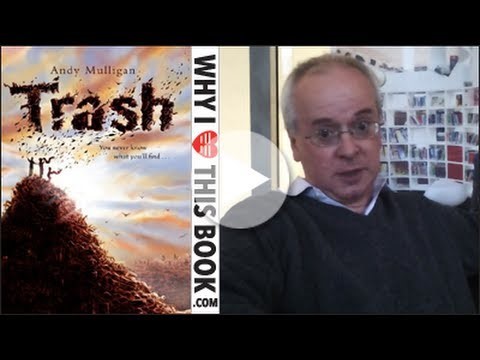
This project promotes open access materials and has been funded with support from the European Commission - Erasmus+ program. These materials reflect the views only of the author, and the Commission cannot be held responsible for any use which may be made of the information contained therein.
[Project Number: 2016-1-HR01-KA201-022159]
![]()
Book title
Trash
Author
Andy Mulligan

Bibliographic information
Publisher: Algoritam
Translated: Vedrana Zupanić
05/2013.
172 pg., hardcopy
ISBN 9789533164106
Links (adaptations, reviews, full texts etc.)
https://www.mvinfo.hr/knjiga/9133/smece
movie TRASH , 2014., Great Britain, Brasil, 104 min.
https://mojtv.hr/film/38955/smece.aspx
Theme
Honest and warm story about kids who live on a landfill
Short summary
In an unnamed third world country, not so far from the future, three boys live on a landfill and survive by digging up the mountains of trash in search for anything they could sell. One day, Raphael finds something very unique and mysterious – a leather bag with unusual content inside. He decides to keep it even though the police have offered a reward for whoever finds it.
However, the consequences of their decision can be scary and the three boys need to run for their lives and find out the true story behind the bag. Raphael, Gardo and Rat – boys with no education, parents, a home or money – will solve the mystery and amend justice.
Why is the story appropriate for the targeted groups of RSP readers?
- It refers to children of the lower social class (identifying one with the Roman national minority)
- Promotes voluntary work
- Promotes thoughts about abandoned and abused children.
What are the distinguished readers interests reflected by this book/story?
- Elements of a detective book
- Challenge the reality of facing real adult life
- Brave quest for the truth and justice
Why is this story motivational for the pupils?
It brings up different controversy’s and levels of the book – problem of corruption, change of narrator, problem of violence among children, identifying oneself with peers, question of identity – Who am I and who are my friends? What is our status in the society?
Is there a historical, political, multi/inter cultural, migrant or similar context recognized in this book/story?
Our society is still not on the edge to poverty. It recognizes the questions of social justice, faith in institutions, problems of corruption, the question of neoliberalism ideology – Who is stronger, oppresses?
Is there a principle of inclusion reflected in this book/story and does it promotes understanding of cultural diversities and heritage?
Inclusion is presented indirectly - the children are isolated, not included in the activities of the real world. Why doesn’t the government do something for them to integrate them to the system, why aren’t they included?
Comparison with inclusion in the Republic of Croatia is visible – are the poor ones isolated here, how and where do they live, what do people know about these problems?
Contact
X gimnazija ''Ivan Supek''
Ul. Vjekoslava Klaića 7
10000
Zagreb
E-mail: partners@handbook4rspreaders.org










